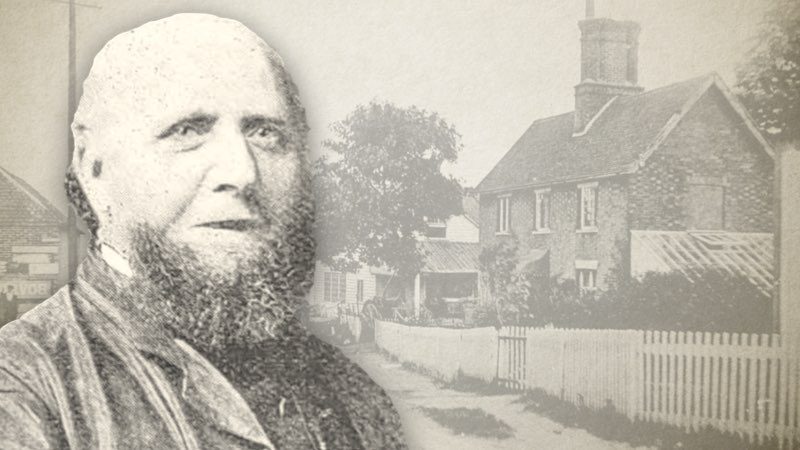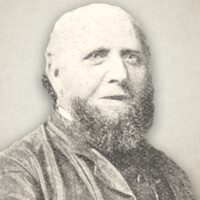
The Life And Ministry Of Isaac Lewis
The Sower 1896:
The Late Mr. Isaac Lewis
Pastor Of Providence Chapel, Staplehurst
Another standard bearer has been taken home to his eternal rest; one that will be greatly missed by his widow, his Church and congregation (to whom he ministered for nearly twenty-one years), and by his many friends scattered about the country.
When William Burch, the former pastor, was taken home, many were ready to wonder if the loss so keenly felt would ever be repaired; but the Lord prepared an instrument fitted for the work, which in due time was made manifest, and his ministry made useful to the household of faith. We trust the remembrance of what God did for them in days gone by may lead the Church and congregation, in their present bereavement, to earnestly wrestle with the Master of assemblies to again appoint them an under shepherd, endowed with like grace and gifts as their former pastor.
Mr. Lewis was born at Burnham, in Essex, on August 13th, 1823, of gracious parents, his mother dying when he was eight years old. In his young days his life was several times preserved in times of danger, but he grew up, as he said, “’like a wild ass’s colt,’ hardened to everything that was good, and greedily running after evil;” and eventually, with two other boys, he ran away from home and took to a seafaring life on board a man-of-war, where he continued for nearly four years. After he was paid off from the ship he gave full bent to the propensities of his evil heart, much to the grief of his godly father, who adopted the language of David, “Oh, Isaac, my son, my son Isaac! Oh that God would stop thee in thy mad career and downward course to hell.” His father’s prayers were heard, but he did not live to see them answered. At the age of twenty-two Mr. Lewis married, as might have been thought, improvidently, as after he had paid for his wedding dinner he had only one half-crown left, and no furniture, so had to go into lodgings; but his marriage proved a great blessing, for his wife proved a most excellent helpmeet, and they soon had a comfortable home. His wife also prevailed upon him to attend his father’s chapel. One Sunday evening the minister was speaking of sin, righteousness, and judgment, when the Holy Ghost convinced him that he was a sinner, and brought him into great anguish of soul, in which he cried and begged for mercy. He felt a little secret hope that the Lord would be gracious, by which he was sometimes encouraged, but only soon to be cast down again; but after many risings and sinkings the day of deliverance came. One Lord’s Day morning he awoke feeling dark and cold, and told his wife that he would have no more to do with religion; she replied, “Let us go today.” His feelings became softened, and he accompanied her to chapel. Mr. Westhorp spoke from Psalm 130, which Mr. Lewis had some time before had a sweet season in meditating upon. He listened to the discourse with much comfort and satisfaction, and he went home with a sacred calm upon his mind. About five o’clock in the evening the words came into his mind with much softness and feeling, “The blood of Jesus Christ God’s Son cleanseth thee from all sin.” This brought a feeling of pardon home to his soul, but, Gideon like, he said, “Lord, this is a blessed portion, but do give me another token;” and he wrestled with the Lord till his strength was spent, and the Lord spoke home to his soul Job 19:25-27, “I know that my Redeemer liveth, and that He shall stand at the latter day upon the earth: and though after my skin worms destroy this body, yet in my flesh shall I see God: whom I shall see for myself, and my eyes shall behold, and not another.” And now for a time his heart was filled with rejoicing. After a time he felt a loving desire to walk in the ordinances of the Lord’s house. He went before the Church, and having given in his testimony, he was unanimously received by the minister and the Church.
In the month of January, 1866, while he was out in his boat fishing, he nearly lost his life. He went forward to handle the sail; it was very cold and a heavy sea running, when the strop of the foresheet broke, and threw him violently overboard, head first, and he sank under the vessel. The thought of eternity flashed through his mind, and the enemy said, “Where is your hope? it is all over with you now;” but these words came again to him with power, “The blood of Jesus Christ cleanseth from all sin.” The enemy fled, and hope sprang up in his breast. Almost at the same time he rose to the surface of the water, when he saw the little boat, which was being dragged after the larger one, and he knew that his only hope of being saved would be if he was enabled to grasp the boat before she went by, which he was enabled to do. His brother, who was on board the fishing boat, said that he rose out of the water like a man who had his feet upon something solid, and who gave a spring to reach his object. Mr. Lewis felt his feet were upon something solid, for he realized his standing upon the Rock of eternal ages. This is only one of the many narrow escapes and deliverances from death that Mr. Lewis experienced during his seafaring life.
When Mr. Lewis went on one of his voyages to West Hartle-pool, he sought out a few of the Lord’s people who met for worship in an upper room, where he joined them at a prayer-meeting one Sunday afternoon. After it was over he was pressed to speak to them in the evening; this occasioned him much anxiety of mind, but he was constrained to go, and was enabled to speak to them from Romans 5:9, and the Lord so helped him that the people rejoiced and were glad. He had previous to this had much exercise of mind respecting the ministry, and having been helped in his first attempt, he felt constrained to speak again to them as opportunity offered. He had many straits and trials, out of which the Lord delivered him, and in which he learnt many lessons which made his ministry profitable. For several years he laboured hard six days in the week for the bread that perisheth, and then on the Sabbath would travel several miles, conduct three services, return home at night, and found a weary body to commence his Monday’s work. This led him to pray to the Lord that He might make a way for him, where he might preach the Gospel without so much labouring and travelling. A minister that he was acquainted with had several engagements at Staplehurst in Kent, but finding through illness that he was unable to fulfil his engagements, he recommended Mr. Lewis to the friends in his stead; this led to his going there to preach to the people, and his testimony being acceptable he was asked there repeatedly. On the occasion of his third visit he was so favoured in his soul early on the Monday morning, that it seemed to draw his affections to the people and to the place; and moreover he felt a firm persuasion that the Lord intended him to settle amongst the people as their pastor. And so it came to pass, for in due course he received a unanimous call, which he accepted; and here he continued to labour in season and out of season for nearly twenty-one years, and now the labourer has entered into his rest.
His summons home was somewhat sudden. He has recently been much favoured in preaching and in private, and a few Sundays ago he spoke of the sweetness that he had felt from the Lord in his meditations, and remarked, “I don’t know what the Lord is about to do with me.” He preached at Mayfield on Lord’s Day, August 23rd, where he seemed much favoured, and spoke three times from Psalm 23, in which portion of Divine truth he saw so much fulness that he felt he could have spoken from it, as he observed, three times three. He returned home on the Monday morning feeling very poorly, and did not seem to improve as the week went on. To some of his friends who saw him on the Wednesday evening he spoke of Medley’s death, and what a hard struggle it seemed for him (Medley) to part with his Church and people, little thinking that within fifty-four hours he would be in bliss with the glorified hymn writer.
He arose on Thursday as usual, but was taken after breakfast with excruciating pain, which rapidly brought his strength down. He remained unconscious during most af the time, so that little converse could be held with him, and in spite of the skill and attention of his medical adviser, the severe inflammation prevailed and stopped the heart’s action, and he passed away calmly and peacefully at five o’clock on Saturday morning, Angusst 29th, 1896, aged seventy-three, to be for ever with the Lord.
The funeral service was conducted by Mr. George Frost, of Jarvis Brook, and the solemnity of the time will not soon be forgotten. A service was held in the chapel at half-past two, before proceding to the churchyard. About three hundred people attended the service and followed the hearse, and each seemed to realize in some measure that Staplehurst had lost a good man and a useful minister of Christ. The following ministers were present—Mr. Lush, Marden; Mr. Penfold, Tonbridge; Mr. Thomas, Culcombe; Mr. Boorman, Lamberhurst; Mr. Parisli, Abingdon; Mr. Miles, Mayfield; Mr. Butler, Frittendon; and Mr. Thatcher, the minister of the Congregational Church, Staplehurst, who also sent a very sympathetic letter on behalf of his Church. This act of courtesy was in direct contrast to the uncourteous action of the Rector of Staplehurst, who positively refused that the bell should be tolled on the occasion, although some Nonconforrnists had subscribed to the purchase of the new bells some years since, when it was understood that a bell should be tolled when a Dissenting funeral took place; but this the Rector refused to allow at the funeral of the Baptist minister, whose memory is held dear by hundreds, both for his ministry and moral worth. We believe other particulars of Mr. Lewis’s life and ministry will presently be published.
Isaac Lewis (1823-1896) was a Strict and Particular Baptist preacher. In 1871, he was appointed pastor of the church meeting at Providence Chapel, Staplehurst, Kent. He remained in this sphere of ministry for twenty-one years, until the Lord was pleased to call him home.



